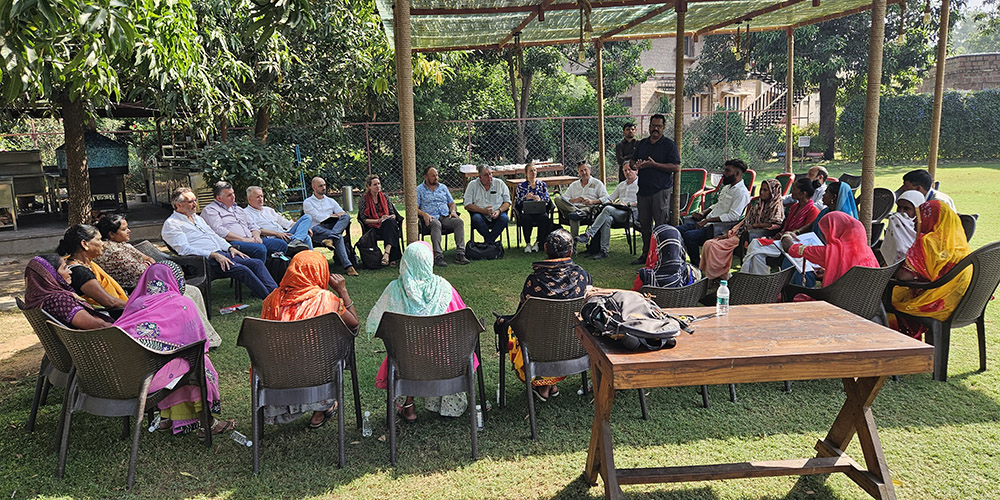Projects
Members of the TruStone Initiative collectively carry out projects to map out risks and tackle malpractices.
- Stakeholder dialogue Rajasthan
- Stakeholder dialogue Zimbabwe
- Social dialogue South India
- A living wage with Steel Grey
Stakeholder dialogue Rajasthan
The extraction and processing of sandstone entails many risks. Due to the complex value chain of processing sandstone into cobblestones, a collective approach is needed to address risks.
In 2021, a broad stakeholder dialogue was initiated between sandstone suppliers and local organisations in Rajasthan (India), TruStone companies and Dutch NGO Arisa. Rajasthan is the largest sandstone producing state in India. The purpose of the dialogue is to share challenges and good examples and jointly formulate practical solutions to achieve a responsible and sustainable sandstone sector in Rajasthan.
Read the risk analysis in India
The participants in the dialogue have agreed to cooperate at the level of both the suppliers (factories) that process sandstone mechanically as suppliers deeper in the chain (in the quarries and cobble yards - collection points where hand-cut cobblestones are packed for export) and places where sandstone cobblestones are cut (small workshops and home units).
To further increase the common understanding of the local context, the progress made so far and the challenges the sandstone industry and its workers still face, five TruStone importing companies, NGO Arisa, local NGOs ARAVALI and Manjari and local sandstone suppliers took part in a field trip to Bundi district in Rajasthan in October 2023. Together, they visited several production locations, schools and other community projects and had conversations with workers about working conditions, like wages, safety issues, living conditions for their families. Besides the field trip, the program was filled with trainings on purchasing practices and social dialogue and a dialogue session with all stakeholders that resulted in concrete action points.
The participants were pleased with the outcome of the visit and consider it to be fundamental and fruitful for the continuation of the dialogue. A smaller group (project team) will work on a proposal for the next steps to continuing the collective approach. A starting point of the next phase of the project is to jointly agree on a declaration of intent that outlines clear commitments of the parties involved in the dialogue.
Through this approach, the parties want to contribute to:
- Formalising labour in sandstone quarries. Registering employees as a necessary first step to clarify who actually works in which quarry. With a formal employment contract, quarry workers can claim their rights.
- Reducing child labour and forced labour in quarries and in the production of sandstone cobblestones.
What has been accomplished so far thanks to this stakeholder dialogue?
- Reinforcing and aligning the efforts made by local organisations for stakeholders in high-risk countries.
Many efforts have been made for many years by Indian civil society organizations Manjari Sansthan and Aravali, such as taking children out of workplaces and bringing them to school, training workers about their rights, and helping them register with an e-registration system to claim social security programs of the government of India. They also enter into dialogue with the government in Rajasthan to ensure that drinking water is provided in the region. The multi-stakeholder dialogue ensures that these efforts are strengthened and supported by raising awareness of the issues among sandstone importers and suppliers. The dialogue also ensures good coordination among different actors about who does what. - Increased awareness of risks and strengthened cooperation between importers and suppliers for the benefit of workers.
By making risks part of the discussion during the dialogue, practical solutions emerge. For example, some participating suppliers have started paying their sub-supplier via bank transfers instead of cash. This increases transparency and formalises relationships between companies in the sandstone chain. - More trust and momentum created between suppliers and importers to collaborate in order to tackle the risks in the supply chains.
There has been more openness about where materials come from and how they are processed and there is more willingness to collectively starting a process to increase the capacity of all players in the supply chains around international responsible business conduct.

Participating companies:
- Brachot
- Maris Natuursteen
- Stone NV
- Stoneline
- Tuinmaterialen Meynen
Exporterende bedrijven:
- Arcadia Enterprises
- Arvicon International
- Bundi Silica
- Minestone export
- Poddar stones
- Santoshi Stone
- Stone Factory
Organisaties:
- Arisa
- ARAVALI
- Manjari Sansthan
Stakeholder dialogue Zimbabwe
The risk analysis for the natural stone sector in Zimbabwe was completed in 2021. For companies that import materials from Zimbabwe it gave better insights into the actual situation. In 2022 TruStone Initiative members are developing a strategy to improve the situation for people involved in the supply chains. That is why we look into which stakeholders in Zimbabwe need to be involved in the dialogue and how these meetings can be set up efficiently between companies (suppliers and importers), the governments and local organisations (trade unions and NGOs).
Read more about: the risk analysis in Zimbabwe.
Social dialogue South India
This dialogue is under development. More information will follow in the coming months.
A living wage with Steel Grey
In 2022 exploratory conversations are scheduled between companies that source Steel Grey (type of granite) from Andhra Pradesh (India) to investigate the possibility to start a project to research what a living wage would be in this specific region. The company Arte di Granito and the NGO Arisa have been working together in the region for years to tackle several risks, including not paying a minimum wage or living wage. An inventory is made of how TruStone members are able to join in on the existing knowledge and experiences already gained.
